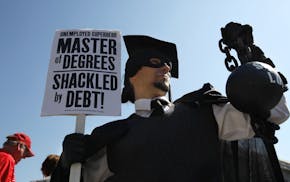Directors at Regis Corp. will decide in the coming days whether to sell the nation's largest salon company, with the decision ultimately hinging on whether the company receives bids "that reflect our value," CEO Paul Finkelstein said recently.
Finkelstein, who also serves as chairman of the board, should recuse himself from that evaluation.
This may not be a polite thing to say, and it's certainly not intended to diminish the accomplishments of Finkelstein, who has helped build Edina-based Regis into the dominant national brand.
But at 68, after 14 years as CEO and eight as president, Finkelstein finds himself in the unusual position of standing to gain more from the sale of Regis than he would by say, retiring and giving a new CEO the chance to pull the company out of its five-year funk.
Shareholder Value Advisors estimates that Finkelstein would receive about $66 million in a sale, assuming that a buyer pays about $24 per share for Regis. That's almost $40 million more than his "estimated current wealth," a calculation based on stock and option holdings, pension benefits and the present value of future pay. Most of the difference between the two figures comes in the way of stock grants and other payments triggered only by a sale.
This is a scenario Regis' board should not have allowed to happen, said Jeffrey Sonnenfeld, a professor at the Yale School of Management and author of "The Hero's Farewell," an acclaimed study of CEO succession. That directors approved change of control provisions that now provide an incentive to sell Regis "is not exonerating," Sonnenfeld said. "It's shameful and it may not be in the best interests of shareholders."
Regis declined to make Finkelstein available for an interview, or to comment on any matter related to its potential sale.
Regis' roots in the Twin Cities go back to 1922, when Paul Kunin opened his first barbershop. His son, Myron, bought the business in the 1950s and quickly seized on the opportunity to locate in malls and shopping centers being built for America's suburban classes. For most of its life Regis was privately owned, and for many years after it went public it was majority-controlled by Kunin, who recruited Finkelstein in 1987.
Today Regis owns, franchises or has ownership interests in 12,700 salons in North America, Europe and Asia. To outsiders, though, it still has the feel of an insular family company. Its five outside directors are respected, longtime fixtures in the Twin Cities business community, but three of them have been on the Regis board for an average of 17 years. Finkelstein and each of the company's four other highest-paid executives have been with Regis an average of almost 27 years.
Myron Kunin retired from the board a couple of years ago, but his son, David, has been on it since 1997. David Kunin also owns, with his father, a beauty products manufacturer that has sold $2.8 million worth of product to Regis in the past four years. The subscriptions to the magazines that customers peruse in Regis' salons were sold by Timothy Kunin, David's brother, who has been paid $1.3 million by Regis since 2007. And Michael Finkelstein, the CEO's son, is an insurance agent who received $1.6 million in commissions from Regis during the same period. The transactions were approved by the board, though its audit committee has "not adopted formal policies or procedures" to review or approve transactions with family members or insiders.
Regis' operations slipped before the recession, and it hasn't done much since then to inspire Wall Street's confidence. Sales are flat, traffic to its salons is weak and its stock price is 50 percent below the five-year high. In its most recent quarter, Regis said sales fell more than 4 percent at salons open a year.
But when it comes to executive pay, Regis' board has been accommodating. It created a "supplemental award opportunity" that resulted in additional payouts when it became clear that executives would not otherwise qualify for short-term incentive pay in the fiscal year ending June 30, 2009. Last year, the board implemented new guidelines for incentive pay to reflect the fact that the company was in transition from a "growth" company to a more "mature" one. It resulted in the maximum payout of more than $2 million to Finkelstein and other executives.
Given the duration of Finkelstein's tenure, and the fact that recent proxy statements make no mention of succession planning, Sonnenfeld thinks Regis' board may have fallen into the common trap of assuming that one person is uniquely qualified to run the company.
"This undermines any chance of the board conducting a thoughtful, independent objective review of the CEO's performance, or the company's performance," Sonnenfeld said.
Regis' stock price is up almost 40 percent since the For Sale sign was turned on in August, a clear suggestion that investors expect a deal. One likely bidder may be Clayton, Dubilier & Rice, a private equity firm that already owns Sally Beauty Holdings, a specialty retailer and distributor of professional beauty supplies.
Regis met Sally once before, in 2006, when Finkelstein struck a $2.6 billion deal to buy Sally from Alberto Culver Co. The sale got clipped three months later by Alberto Culver, which cited weakening performance at Regis and "certain differences over operating and governance approaches."
ericw@startribune.com • 612-673-1736

Wieffering: Time to get over debit card fees
For Thrivent and others, warnings were there

With billions in sales, some co-ops are big business
